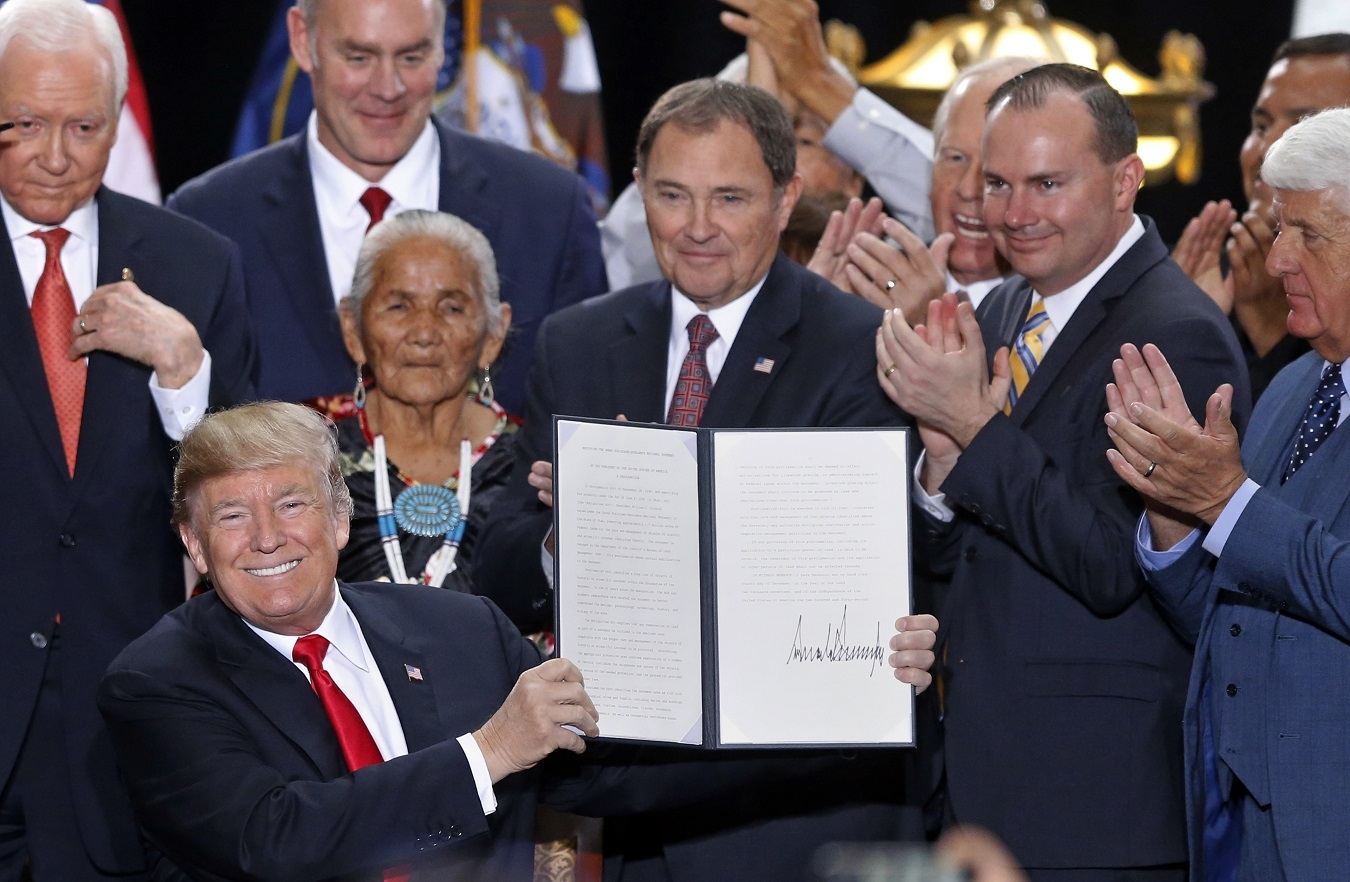National
Trump takes rare step to reduce 2 national monuments in Utah

SALT LAKE CITY — President Donald Trump on Monday took the rare step of scaling back two sprawling national monuments in Utah, declaring that “public lands will once again be for public use” in a move cheered by Republican leaders who lobbied him to undo protections they considered overly broad.
The decision marks the first time in a half century that a president has undone these types of land protections. Tribal and environmental groups oppose the decision and are expected to go to court in a bid to stop Trump and Interior Secretary Ryan Zinke.
Trump made the plan official during a speech at the State Capitol, where he signed proclamations to shrink the Bears Ears and Grand Staircase-Escalante national monuments. Both monuments encompass millions of acres of land.
State officials said the protections were overly broad and closed off the area to energy development and other access.
Environmental and tribal groups say the designations are needed to protect important archaeological and cultural resources, especially the more than 1.3 million-acre (2,030-square-mile) Bears Ears site featuring thousands of Native American artifacts, including ancient cliff dwellings and petroglyphs.
Trump argued that the people of Utah know best how to care for their land.
“Some people think that the natural resources of Utah should be controlled by a small handful of very distant bureaucrats located in Washington,” Trump said. “And guess what? They’re wrong.”
Roughly 3,000 demonstrators lined up near the State Capitol to protest Trump’s announcement. Some held signs that said, “Keep your tiny hands off our public lands,” and they chanted, “Lock him up!” A smaller group gathered in support, including some who said they favor potential drilling or mining there that could create jobs. Bears Ears has no oil or gas, Zinke told reporters, though there is coal in Grand Staircase-Escalante.
“Your timeless bond with the outdoors should not be replaced with the whims of regulators thousands and thousands of miles away,” Trump said. “I’ve come to Utah to take a very historic action to reverse federal overreach and restore the rights of this land to your citizens.”
Bears Ears, created last December by President Barack Obama, will be reduced by about 85 percent, to 201,876 acres.
Grand Staircase-Escalante National Monument, designated in 1996 by President Bill Clinton, will be reduced from nearly 1.9 million acres to 1,003,863 acres.
Both were among a group of 27 monuments that Trump ordered Zinke to review this year.
Zinke accompanied Trump aboard Air Force One, as did Utah’s Republican U.S. senators, Orrin Hatch and Mike Lee. Hatch and other Utah Republican leaders pushed Trump to launch the review, saying the monuments designated by the former Democratic presidents locked up too much federal land.
Trump framed the decision as returning power to the state, saying, “You know and love this land the best and you know the best how to take care of your land.” He said the decision would “give back your voice.”
“Public lands will once again be for public use,” Trump said to cheers.
Hatch, who introduced Trump, said that when “you talk, this president listens” and that Trump promised to help him with “federal overreach.”
Patagonia President and CEO Rose Marcario said the outdoor-apparel company will join an expected court fight against the monument reduction, which she described as the “largest elimination of protected land in American history.”
No president has tried to eliminate a monument, but some have reduced or redrawn the boundaries on 18 occasions, according to the National Park Service. The most recent instance came in 1963, when President John F. Kennedy slightly downsized Bandelier National Monument in New Mexico.
Trump’s move against Bears Ears, covering lands considered sacred to tribes that long pushed for protections, marks his latest affront to Native Americans.
Trump overrode tribal objections to approve the Dakota Access and Keystone XL oil pipelines, and he used a recent White House event honoring Navajo Code Talkers to take a political jab at Sen. Elizabeth Warren, a Massachusetts Democrat he has nicknamed “Pocahontas” for her claim to have Native American heritage.
Trump signed an executive order in April directing Zinke to review the protections. Trump is able to upend the protections under the 1906 Antiquities Act, which gives presidents broad authority to declare federal lands as monuments and restrict their use.
Zinke has also recommended to Trump that Nevada’s Gold Butte and Oregon’s Cascade-Siskiyou monuments be reduced in size, though details remain unclear. The former Montana congressman’s plan would allow logging at a newly designated monument in Maine and more grazing, hunting and fishing at two sites in New Mexico.
Democrats and environmentalists have opposed the changes, accusing Trump and Zinke of engaging in a secretive process aimed at helping industry groups that have donated to Republican political campaigns.







